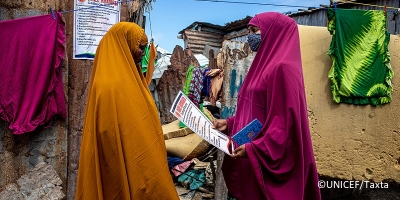You are here
Recognizing the essential role of the social service workforce for child protection - In March and everyday

Reposted from UNICEF Eastern and Southern Africa with permission. View the original.
 Throughout the month of March and on World Social Work Day on March 16, social service workers around the world are celebrated and recognized for their essential role in the daily lives of individuals, families and communities.
Throughout the month of March and on World Social Work Day on March 16, social service workers around the world are celebrated and recognized for their essential role in the daily lives of individuals, families and communities.
As we raise our voices in appreciation, now is also an opportune time to call for increased recognition and support for the crucial frontline role played by these workers during and prior to COVID-19.
The social service workforce for child protection plays a central role in promoting social justice; reducing discrimination and root causes of inequality; challenging harmful behaviours and social norms; preventing and responding to violence, abuse, neglect and exploitation; tackling harmful practices such as child marriage and female genital mutilation; and addressing family separations especially among migrants, refugees and internally displaced persons.
They also support poverty reduction initiatives, including social protection and cash transfer programs, and respond to humanitarian crisis situations.
This year’s theme of World Social Work Day is Ubuntu: ‘I am because we are’ – Strengthening Social Solidarity and Global Connectedness. Ubuntu originates from the indigenous peoples of South Africa and was popularized across the world by Nelson Mandela.
Nurturing relationships are central to social service professionals in all aspects of work. The promotion of indigenous knowledge remains critical to informing approaches to delivery of social service interventions.
As we reflect on the challenges of the past year, we also must recognize the unsung heroes who continued carrying out essential services during this time. COVID-19 has had a significant impact on how the social service workforce delivers services and interventions.
At a time when individuals and communities, as well as workers themselves, face heightened challenges, the social service workforce has remained at the heart of building connections and linkages and ensuring the continuity of promotive, preventative and responsive services.
Social service workers ensure healthy development and well-being for children, youth, adults, older persons, families and communities. During COVID-19 they have carried out many essential services.
Social service workers are essential
New safety concerns and the resulting need for technology to connect with people remotely have impacted how the social service workforce have reached the most vulnerable children and their families.
UNICEF has provided funding, technology, training and advocacy to support social service workers in being adaptive, creative and flexible in innovating new ways of making their services effective, while still upholding their professional values and standards of service.
In many communities, social service workers also provide health education and link with education, justice and health services for a continuum of care and services.
This transformation in social services has helped them transform lives under the most difficult circumstances.
In an online survey conducted by the Global Social Service Workforce Alliance in April 2020 to determine the types of services the social service workforce is providing during COVID-19, 54 per cent of respondents indicated they are providing mental health and psychosocial support services.
Mental health and psychosocial support needs have been exacerbated during this period of heightened stress.
Workers also shared that they are providing a range of child protection and gender-based violence services, ensuring children affected by COVID-19 have access to adequate alternative care arrangements and delivering protection services for children left without a care provider.
In a recent blog, Cornelius Williams, Associate Director and Global Chief of Child Protection for UNICEF Programme Division, highlighted the important role of the social service workforce for child protection and UNICEF’s continued commitment to ensuring they have the necessary tools to carry out this important work.
“The pandemic has brought social service workers who are often invisible – working “behind the scenes” – to the forefront and helped [UNICEF] highlight the critical role they play in children’s lives…Now is their time to take centre stage in this decade of action and beyond.”
As UNICEF continues to join with practitioners, organizations and other groups in celebrating the many ways this workforce has provided essential services during COVID-19, we must also act now to ensure they are properly equipped to address the many new and increased inequities individuals and communities will face long after the pandemic itself ends.
We call on all governments to invest now in this frontline workforce and develop supportive policies to ensure that the proper number of trained workers is available to meet immediate and ongoing needs. By doing so, everyone in the community will benefit.
